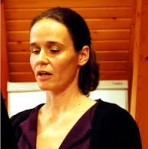AN INTERNMENT CAMP COMMANDER’S STRUGGLE
The Story of István VasdényeyPart II ‘The train departed a second time.’1The title of István Lengyel’s conversation with the poet Erzsi Szenes, an inmate of the Kistarcsacamp. See: István Lengyel, ‘A vonat másodszor is kirobogott… Beszélgetés Szenes Erzsi költőnővel,a Hunsche-Krumey per tanújával’ (The Train Departed a Second Time … Conversation

